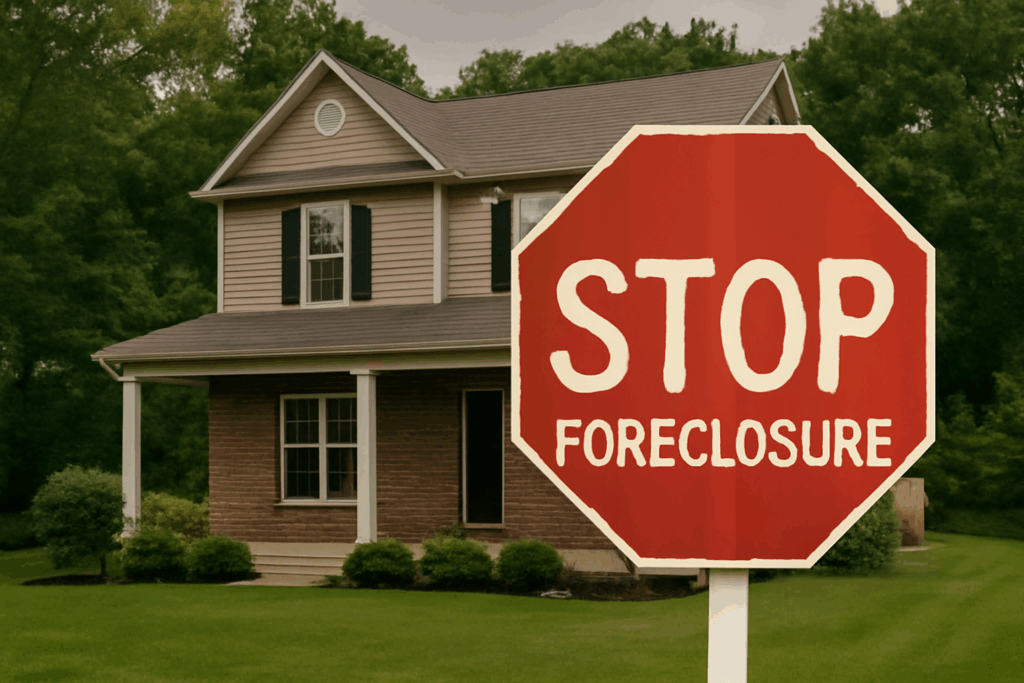Introduction
If you’re searching for how to stop the bank from foreclosing on your Maryland house, you’re likely in a state of stress, confusion, and urgency. You’re probably facing mounting pressure from your mortgage lender, possibly receiving multiple notices or phone calls demanding payments you can’t meet. The thought of losing your home is daunting, and you’re searching for immediate solutions that can help you regain control of the situation before it’s too late. You’re likely looking for clear, actionable steps to either stop the foreclosure process or buy yourself some time while exploring your options. You need to know whether it’s possible to prevent foreclosure through negotiation, refinancing, a loan modification, or if your only option is to sell your property. You may also have concerns about your credit score, legal implications, and whether or not selling your home for cash to a real estate investor is a better option than fighting the bank in court.
This blog is here to address all of these questions and concerns. We’ll walk you through the specific steps you can take to stop or delay foreclosure, including strategies like loan modification, filing for bankruptcy, and selling your home. We will also explain why selling your house for cash to a real estate investor could be your fastest and most beneficial option.
How to Stop the Bank from Foreclosing on Your Maryland House

When you’re facing foreclosure in Maryland, it can feel like you have no options left. The bank is threatening to take your home, and you may be overwhelmed by the mounting bills, communication from lenders, and the pressure to find a solution. Understanding your options and taking immediate action is crucial to stopping the foreclosure process before it’s too late. In this guide, we’ll walk you through effective ways to stop foreclosure and explore the best course of action to help you keep your home or make a fresh start if necessary.
1. What Happens When the Bank Starts the Foreclosure Process in Maryland?
Before we dive into the specific strategies for stopping foreclosure, it’s essential to understand what happens when a bank initiates foreclosure proceedings in Maryland. Maryland is a judicial foreclosure state, meaning that the foreclosure process requires a court hearing. Typically, this process begins after you have missed several mortgage payments, usually around three months. At that point, the lender will file a foreclosure lawsuit.
Once the lawsuit is filed, you will receive a notice of foreclosure that serves as a warning. You have a right to respond and can even contest the foreclosure if there are issues with your mortgage or payments. However, many homeowners are unaware of the severity of the situation until they receive this notice, making it crucial to address the issue as soon as possible.
If you’re facing foreclosure in Maryland, the bank may sell your home at a public auction. However, this is a process that takes several months, and you have several opportunities to stop or delay it. The key is acting quickly and understanding your options.
You can learn more about the judicial process and how it affects you in our page on Understanding the Foreclosure Process in Bethesda MD.
2. Can I Stop Foreclosure by Negotiating with My Lender?
In many cases, it’s possible to negotiate with your lender to stop foreclosure. Mortgage lenders would often rather work with you to find a solution than go through the lengthy process of foreclosure. Here are some of the most common options for negotiating with your lender:
Loan Modification
A loan modification involves changing the terms of your loan to make the payments more affordable. This could include lowering your interest rate, extending the length of the loan, or adding missed payments to the back of the mortgage. Loan modifications can provide immediate relief if you’re struggling with monthly payments but are still able to afford a modified loan. However, approval isn’t guaranteed, and the process can take time.
Repayment Plan
A repayment plan allows you to make partial payments on top of your regular mortgage payments to catch up on missed payments. This option is suitable if you’ve experienced a temporary financial setback but can afford to pay a little more each month to get back on track.
Forbearance Agreement
If you’ve experienced a temporary financial hardship, such as medical issues or a job loss, you might qualify for a forbearance agreement. This agreement allows you to skip mortgage payments for a period, often 3–6 months, without the lender initiating foreclosure. After the forbearance period ends, you’ll resume regular payments, and any missed payments will typically be added to the back end of the loan.
If you are seeking more in-depth knowledge on loan modifications and repayment plans, you can refer to our related content on How to Avoid Foreclosure in Rockville MD.
3. Selling Your House to Stop Foreclosure
If negotiating with your lender doesn’t seem like a viable solution or you feel you can’t afford a loan modification, selling your home may be your best option. Selling your home, especially to a cash buyer or real estate investor, can stop foreclosure immediately and give you a fresh start. Selling your home for cash is a quick process, often taking as little as two weeks to close.

In many cases, homeowners facing foreclosure don’t have the luxury of time, and selling your home for cash can be an excellent way to avoid a damaging foreclosure on your credit report. The sale of your home may allow you to pay off your existing mortgage balance, and any remaining funds can be used for relocation or to cover your next steps.
One of the advantages of selling to a cash buyer is that you can sell your house as-is, meaning you don’t have to worry about making costly repairs or paying real estate agent fees. The sale is typically quick and straightforward.
If you’re in a situation where selling your house fast is necessary, consider reaching out to a trusted real estate investor who can buy your home for cash. This option is often the fastest and most stress-free way to stop foreclosure.
If you need more detailed information about selling your home quickly in Maryland, refer to this article on Sell My Silver Spring MD House in Foreclosure?.
4. How Bankruptcy Can Help Stop Foreclosure in Maryland
Filing for bankruptcy is another option for stopping foreclosure, but it comes with significant consequences. When you file for Chapter 13 bankruptcy, an automatic stay is placed on your foreclosure proceedings. This means that the bank must halt the foreclosure process while your bankruptcy case is active.
Chapter 13 bankruptcy involves creating a repayment plan to pay off your debts over three to five years. This can be beneficial if you have a steady income but are behind on payments. However, Chapter 7 bankruptcy, which is a liquidation process, may not prevent foreclosure in the long term, as the bank could still move forward with the sale of your home.
It’s crucial to consult with a bankruptcy attorney before deciding if this is the right path for you, as bankruptcy can severely affect your credit and long-term financial health.
For more on the financial and legal implications of foreclosure, check out Foreclosure Notice of Default in MD – What Is It?.
5. What Is a Short Sale vs. Foreclosure?
Understanding the difference between a short sale and a foreclosure is critical when deciding on your next steps. A short sale occurs when the bank agrees to accept less than what you owe on the mortgage, allowing you to sell the house and pay off the loan for a reduced amount. A short sale can be less damaging to your credit score than foreclosure, and it gives you more control over the sale process.
However, the process of getting approval for a short sale can be lengthy, and there’s no guarantee the lender will approve your request. Additionally, you may be responsible for paying the difference between the sale price and the remaining loan balance if the bank pursues a deficiency judgment.
If you’re considering a short sale, you’ll need to consult with your lender and a real estate agent with experience in short sales. If you want a detailed comparison, you can refer to our blog on Short Sale vs. Foreclosure – What’s the Difference?.
6. The Risks and Benefits of Trying to Save Your Home
While there are various ways to stop foreclosure, not all of them come without risks. For example, negotiating a loan modification or pursuing bankruptcy can have long-term consequences on your financial health and credit score. Additionally, selling your home may provide immediate relief but requires you to give up your property.
Weighing the benefits and risks is crucial. Sometimes, the financial burden of keeping your home is not worth the stress, and selling may provide you with a fresh start. In this case, working with a real estate investor can be an excellent option.
If you’re unsure about what’s best for you, you can get a free consultation with a trusted local investor who can help you navigate your options.
7. How Can a Foreclosure Delay Affect Your Home’s Value in Maryland?
When you’re facing foreclosure, it’s tempting to believe that delaying the process might give you more time to figure things out. However, this strategy could backfire if it leads to prolonged neglect of your home. A delay in foreclosure could affect your home’s value, especially if it’s left in disrepair or becomes a target for vandalism or squatters.
For instance, when the home sits vacant for too long, its condition can deteriorate, and as a result, it may be worth far less than it was when foreclosure first started. Lenders, too, may eventually be forced to put the property on the market at a lower price, lowering the overall value in the eyes of potential buyers.
Moreover, the longer you delay foreclosure proceedings, the more money you might owe in missed payments, penalties, and interest. These additional costs can further hurt your finances and make it harder to recover once the property is sold. In fact, homeowners in Maryland who delay foreclosure too long could see their homes lose up to 10% or more in value, depending on the local market.
If you’re concerned about the potential loss of value in your home, selling it quickly might be the best way to protect your equity. A cash buyer can close in as little as two weeks, ensuring that the home is sold before the damage is too severe.
You can learn more about the costs of delaying foreclosure in Foreclosure in Glen Burnie MD.
8. Can You Save Your Home by Refinancing During Foreclosure?
In some cases, homeowners might consider refinancing their mortgage to stop foreclosure. Refinancing involves taking out a new loan to pay off the old one, ideally at a lower interest rate or with more manageable terms. While refinancing may sound like a viable option, it’s not always an easy solution, especially if you’re already in foreclosure.
Refinancing typically requires a good credit score and a steady income to qualify, which many homeowners facing foreclosure do not have. Additionally, refinancing during foreclosure can be complicated because lenders are reluctant to approve new loans when a borrower is in default. However, it may be possible if you have significant equity in the home, a strong financial history, and can demonstrate that you’ll be able to make future payments.
If refinancing is an option, it could potentially lower your monthly payments, provide you with extra cash, or even lower your interest rate. But for most homeowners, this option can be a gamble, and failing to get approved could worsen your situation.
If refinancing is off the table, consider alternatives like selling your home for cash. This route might be quicker and provide a better financial outcome in the long run.
To explore all your options, check out What Is a Pre-Foreclosure in Hyattsville MD? for more insights on potential solutions.
9. How Does the Foreclosure Process Differ for Investment Properties in Maryland?
If you’re facing foreclosure on an investment property in Maryland, the process might differ slightly from that of a primary residence. Lenders view investment properties as riskier because they are not the owner’s primary living space, and if you’re unable to make payments, there could be less incentive to maintain the property.
Typically, the foreclosure process on investment properties can be faster than for primary residences, with banks focusing more on recouping their losses quickly. Additionally, you may face more stringent requirements to stop the foreclosure process, such as paying off the loan in full or coming up with a significant down payment to modify the loan.
Many investors choose to sell their properties when facing foreclosure instead of trying to navigate lengthy loan modifications or court proceedings. Selling an investment property can often be quicker and more financially beneficial, especially if the property is in a poor condition or if it requires significant repairs.
For investors in foreclosure, selling to a cash buyer can allow them to recover some of the value of the property, avoid further damage, and start fresh with another investment opportunity.
For insights into investment property foreclosures, read Investopedia’s Guide on Foreclosures for Investment Properties.
10. The Importance of Understanding Deficiency Judgments in Foreclosure
A deficiency judgment is a legal claim that a lender can make against you for the remaining mortgage balance after your property has been sold at auction. For example, if you owe $200,000 on your mortgage but your home sells for $150,000, the lender can pursue you for the remaining $50,000.
In Maryland, lenders can pursue deficiency judgments following foreclosure, which could leave you liable for a significant amount of money. This can be a major concern for homeowners who are already struggling financially. To avoid deficiency judgments, it may be possible to negotiate with the lender or pursue alternatives such as a short sale.
In a short sale, the lender agrees to accept less than the full balance owed on the mortgage. This can prevent the lender from coming after you for the remaining balance, but the process is lengthy and not guaranteed. Understanding the potential for a deficiency judgment is critical when deciding between foreclosure and selling your home.
If you’re concerned about the possibility of a deficiency judgment, selling your home for cash could be an effective way to eliminate the debt and avoid the lengthy process of foreclosure.
For more on deficiency judgments in Maryland, check out Maryland’s Law on Deficiency Judgments.
11. How to Protect Your Credit Score While Facing Foreclosure
One of the biggest concerns when facing foreclosure is the impact it will have on your credit score. Foreclosure can cause a significant drop in your credit score, sometimes by 100 points or more. This can make it harder for you to qualify for loans, credit cards, or even rent an apartment in the future. However, there are ways to minimize the damage to your credit score and protect your financial future.
The best way to protect your credit score during foreclosure is to take action as soon as possible. If you can avoid foreclosure through a loan modification or other solutions, you can prevent the foreclosure from appearing on your credit report. If you sell your home for cash to a real estate investor, your credit score may take less of a hit compared to a full foreclosure, as the sale can be seen as a voluntary action.
Even if foreclosure is unavoidable, you can take steps to rebuild your credit afterward, such as keeping up with other bills, reducing debt, and seeking professional credit counseling.
For tips on rebuilding your credit score after foreclosure, check out Equifax’s Guide to Rebuilding Your Credit.
Conclusion: Why Selling Your House to Simple Homebuyers Might Be the Best Option
When facing foreclosure in Maryland, time is critical. Every step you take – whether negotiating with your lender, filing for bankruptcy, or pursuing a short sale – can significantly impact your future. In many cases, selling your home to a trusted cash buyer like Simple Homebuyers is the fastest and most reliable solution. We can stop foreclosure in its tracks, alleviate the stress of dealing with the bank, and give you the financial relief you need to make a fresh start.
Selling to Simple Homebuyers allows you to sell your home quickly, without the hassle of repairs, agent commissions, or lengthy waiting periods. We offer a straightforward, no-obligation cash offer, ensuring a smooth and efficient process that puts you back in control.
If you’re ready to explore your options and get a fair cash offer for your property, reach out to Simple Homebuyers today. The sooner you act, the more options you’ll have, and the better positioned you’ll be to avoid the negative consequences of foreclosure. Let Simple Homebuyers help you take the next step toward a brighter future.

